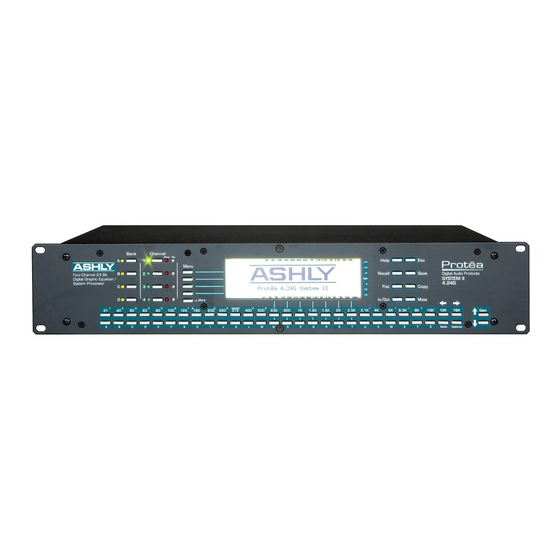Ashly Protea System II 4.24RD Instrukcja obsługi - Strona 5
Przeglądaj online lub pobierz pdf Instrukcja obsługi dla Sprzęt nagrywający Ashly Protea System II 4.24RD. Ashly Protea System II 4.24RD 20 stron. Two/four channel graphic/parametric equalizer/system processor, full function graphic equalizer remote control

1.2 AUDIO FEATURES
The Protea audio components consist of state of the art technologies, beginning with a 24 bit, 48kHz delta-
sigma A/D converter with 128x oversampling. Digital processing includes EQ, Compression, Limiting, Shelving,
Highpass and Lowpass Filters, and Time Delay, taking place in a 100MHz Motorola DSP56303 high performance DSP
processor. D/A conversion uses a 24 bit delta-sigma converter with 128x oversampling. Inputs are precision balanced
and RF protected, while outputs may be wired balanced or unbalanced. All audio connections use XLR and 1/4" phone
jacks for greater flexibility. Up to sixteen different audio channels can be linked together for expanded system control
using the main 4.24G and slave units 4.24GS, 2.24GS, 4.24PS, and 2.24PS.
1.3 USER INTERFACE
A key advantage to the Protea system is that all audio functions are intuitively laid out so that a minimum number of
keystrokes can quickly change a setting on any channel in real time. With this in mind, two entirely different methods to
control the signal processing functions in Protea products have been developed, one using an innovative keyboard interface
which is similar to an analog EQ face, while the other uses custom Windows95/98™ software for the PC.
Keyboard Interface: The keyboard interface on either the main (4.24G) or remote control (4.24RD) displays
information on a 240 x 64 pixel flourescent backlit LCD screen. The combination of the analog-style keyboard and
LCD makes navigating around the Protea amazingly simple. The 4.24RD remote control is essentially the "front end"
of the 4.24G, allowing remote processor control from within reach of the equipment rack, or from a control room over
1000 feet away. Note: The 4.24RD remote controls the main and graphic EQ slaves, but not the two parametric
slaves, 4.24PS and 2.24PS. Parametric slaves require PC control using Protea System Software.
Protea System Software: The second type of interface uses Ashly PROTEA SYSTEM SOFTWARE for the
Windows95/98 environment, which allows complete PC control through a computer's RS-232 serial port. Protea
System Software controls the main 4.24G, and both graphic and parametric Protea slaves. Protea system software is
supplied with slave units, or can be downloaded at no cost from the Ashly web site. At this time, there is no Mac
version of Protea System Software available.
Contact Closures: For Protea slave units, a small switch can be connected for recalling up to six different
pre-programmed settings, or scenes, without the risk of mistakenly changing those settings. Ashly offers a six position
rotary switch assembly which can be mounted to a standard electrical switch box, or can be wired into a custom
installation. See section 6.4 for details.
1.4 PROTEA SYSTEM CONCEPTS
It is important when learning about the Protea to understand several key terms, which are defined below.
Preset Number . . . . 128 different user-defined settings which can be recalled to any channel
Preset Name . . . . . .Every preset number can have an associated name, but it is not required
Local Channel . . . . The physical path in a unit to which audio signals are connected
MIDI Channel . . . . One of 16 different logical channels. A local channel can be assigned any MIDI channel
Current Channel . .The local channel which is currently selected on the LCD display.
Bank . . . . . . . . . . . .On a master or remote unit, a bank combined with a channel selects a MIDI channel number.
Menu . . . . . . . . . . . .Menu items select audio and setup screens for fast access to all Protea features
Softkey . . . . . . . . . . .Any key having multiple uses, depending on the menu item selected
Dialog Box . . . . . . .A pop-up window that requests a response from the user, or displays a change
Master . . . . . . . . . . .The controlling 4.24G unit in a multi-unit Protea system.
Slave . . . . . . . . . . . .Any piece in a multi-unit Protea system which responds to system commands from another unit
Channel Linking . .2, 3, or 4 local channels of a 4.24G may be linked together so that they share the same
Operating Manual - PROTEA SYSTEM II Digital Audio Products
ex. Bank B + channel 1 selects MIDI channel 5, Bank D + ch. 4 selects MIDI channel 16
settings, but maintain discrete audio paths
5
